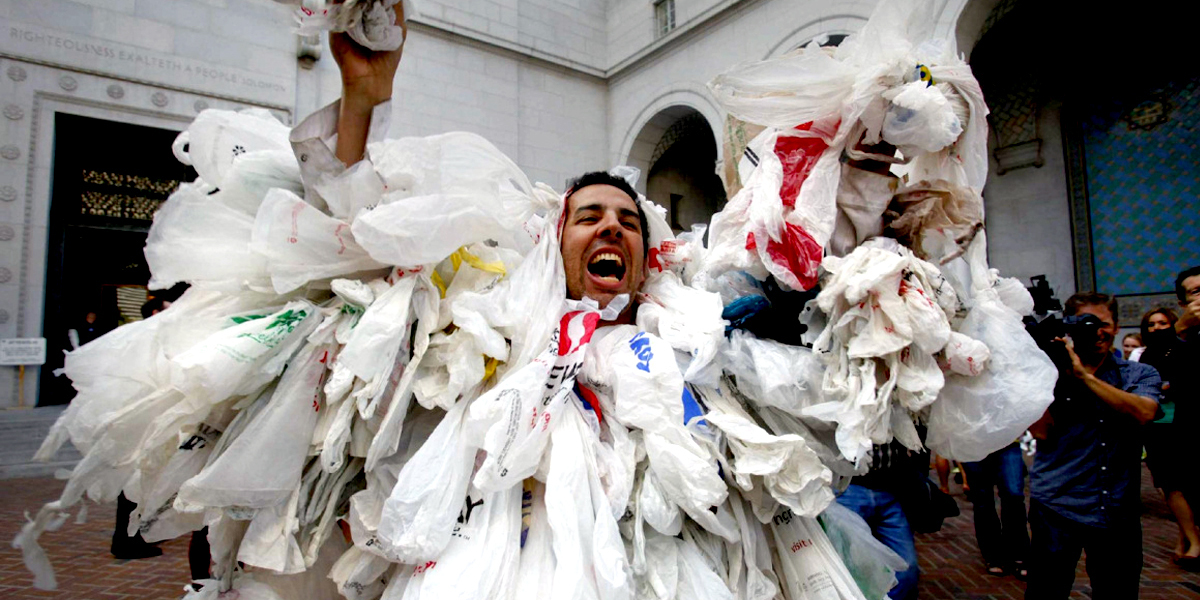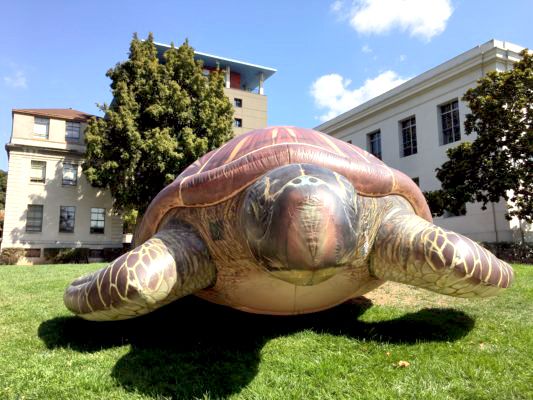

By Matt Davis
California’s environmental protections are not for sale. That’s the message California voters sent to out-of-state plastic bag manufacturers when they upheld Proposition 67 by 53 to 47 percent in November. But how did the Golden State manage to win a state-wide bag ban against a national political backdrop that went the other way?
We Were Massively Outspent, But Had Broader Support
Five out-of-state plastic bag makers spent more than $6 million on the campaign to repeal the ban. Whereas as the campaign to ban plastic bags had a meagre budget of $1.9 million.
“Rarely in California history do local organizations running a shoestring campaign beat out-of-state deep pockets,” said Dan Jacobson, with Environment California, who spent weeks in the run-up to the election driving around the state with an enormous inflatable turtle, aiming to draw voters’ attention to the risks plastic bags pose to wildlife.

The bag-makers’ campaign had just four contributors. The campaign to ban plastic bags was backed by more than 500 organizations, from environmental groups to business organizations and dozens of cities and counties. More than 70 percent of the campaign’s funding came from contributions from the environmental community. More than 40 newspapers endorsed the campaign.
“For me personally, as a movement-leader, I was deeply impressed by the energy and organization of this diverse coalition,” said Shana DeClercq from The Story of Stuff Project. “Cities, mayors, non-profits large and small, individual advocates all pulled together in a cohesive way.”
The Save the Plastic Bag Ban Campaign began at the grassroots level long before the election, said Marce Gutiérrez-Graudiņš, founder and director of Azul, an organization seeking to raise up Latino voices on marine conservation issues.
“Legislators told us Latinos were either ‘too poor to care’ or didn’t support legislation to ban plastic bags at all,” Gutiérrez-Graudiņš said. “We actually knew better and this is where the bag campaign really took off.”
Azul enlisted the help of civil rights leader Dolores Huerta, who penned a couple of op-eds on the issue, as well as Jose Hernandez, a very well-known former astronaut who signed an op-ed of his own, stressing the science behind bag bans.
Azul helped to organize a poll, which reached only people of color throughout the state, and showed an overwhelming support of Latinos and African Americans for a plastic bag ban. They ran in-language focus groups in Los Angeles and San Jose to refine messaging.
“We flipped the script, so to speak, where now Latino staff, elected and community leaders saw themselves as trend setters versus followers,” Gutiérrez-Graudiņš said.
“I believe it is extremely important to highlight the enthusiastic support from the Latino community for Prop 67,” she said.
California Had a Huge Problem on Our Hands
“When Californians become fed up with a problem, we fix it,” said Ryan Kallabis, a spokesman for Save Our Shores. “Nothing that is used for less than five minutes should pollute our environment for centuries.”
And yet, plastic pollution was posing a huge problem for the world’s sixth-largest economy. California Sec. of State Alex Padilla, who introduced SB-270, the legislation that led to the statewide ban, said that three years ago, California retailers were distributing 19 billion single-use plastic shopping bags every year.
“In 2017,” he said, “that number will be zero.”
In the weeks since the ban passed, an estimated 25 million plastic bags each day will have been eliminated from the waste stream.
We Started Local and It Worked
Plastic bags kill wildlife and pollute our environment. The evidence is overwhelming that banning plastic bags in local jurisdictions save wildlife and reduce pollution. At the time of the election, more than 40 percent of California communities were already living without plastic shopping bags through local ordinance. Those communities didn’t want to roll back.
Ironically, the same bag makers behind trying to overturn our statewide ban have been working with the American Legislative Exchange Council to pass statewide bans on local bag bans. They say states should have the right to decide on bans as a whole, but local bans pave the way for state bans like in California, and are crucially important.
https://twitter.com/EcoWatch/statuses/715189889042489344 expand=1]
We Got Creative and Worked With Our Allies to Spread the Word
“We knew that because we were working with a small budget, the Yes on Prop 67 campaign would be won or lost on the outreach and free media components,” said Wendy James, CEO of Better World Group, which chaired the statewide campaign. “We had to rely on our NGO partners. And we had to build a broad coalition. We never turned down a request for a speaking engagement or debate, an opportunity for a letter to the editor or op-ed, and we used our broad base of supporters in a statewide media tour the final month, doing close to 20 news conferences in every media market in the state.”
Clean Water Action and our allies at Save The Bay led a loose coalition of Northern California environmental groups in brainstorming creative ways to get out the liberal Bay Area vote. The groups worked closely with Save The Bay and took thousands of plastic bags back to the headquarters of Novolex, the world’s biggest plastic bag manufacturer, based in South Carolina, broadcasting the action in partnership with Courage Campaign on Facebook Live.
We worked with a local dance studio to stage a Thriller-themed plastic flash mob, taking over a downtown street in Oakland on the eve of Halloween.
[facebook https://www.facebook.com/CleanWaterActionCA/videos/1229363083776354/
More than 50,000 Californians signed a petition to the CEO of Novolex, Stan Bikulege, following a mass email organized in partnership with the Daily Kos. The Story of Stuff used its extensive global network to pump out our message to plastic pollution activists all over the world, and garner added support.
“The Story of Stuff global community was passionately interested in the outcome here,” DeClerq said. “We heard voices all over the world encouraging Californians to stand up against Big Plastic. From Ireland to Buenos Aires to Botswana, people cheered us on.”
Celebrities also got involved, said Dianna Cohen with the Plastic Pollution Coalition. Her organization’s video of movie star Jeff Bridges was viewed by hundreds of thousands of people, drawing precious attention to the issue.
California Took the Lead
Statewide bans are now in the offing in Oregon and New Hampshire, and a state representative in North Carolina said he is planning to introduce legislation modeled on California proposition.
At Clean Water Action, we’re keen to serve as guides for people considering similar laws around the country. We’re also trying to stop waste at its source, by working with businesses and institutions to redesign the way they use single-use disposable packaging with our ReThink Disposable program.
If you’d like to learn more, please get in touch.
Matt Davis is the California communications director for Clean Water Action. He can be reached at mattdavis@cleanwater.org.

 233k
233k  41k
41k  Subscribe
Subscribe 